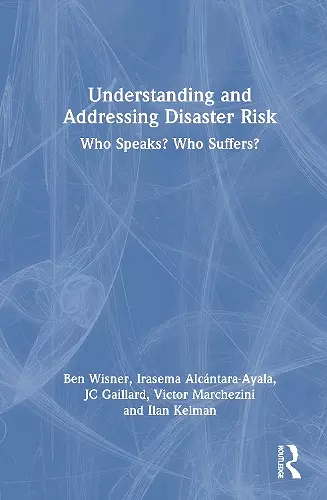Understanding and Addressing Disaster Risk
Who Speaks? Who Suffers?
Ilan Kelman author Ben Wisner author JC Gaillard author Irasema Alcántara-Ayala author Victor Marchezini author
Format:Hardback
Publisher:Taylor & Francis Ltd
Publishing:9th May '25
£145.00
This title is due to be published on 9th May, and will be despatched as soon as possible.
This hardback is available in another edition too:
- Paperback£39.99(9781032274454)

In Understanding and Addressing Disaster Risk, the authors explain how people modify the environment and exert power over each other in ways that make nature potentially harmful and put people in harm’s way. Opportunities and challenges faced by those engaging with disaster risk are explored.
Across 11 chapters, the authors show that disasters are not natural, are not events, and do not happen quickly. Instead, they are the result of chronic societal processes emerging from the creation and perpetuation of vulnerabilities and limitations on people’s abilities to respond to hazards. The book also explores the environmental component of disaster risk through the lens of different natural elements and phenomena, including biological-ecological and water-weather-climate processes as well as geological and outer space dynamics. The authors explain the mutual influence of the different components of disasters in creating disaster risk across diverse regions of the world. They critique attempts to reduce disaster risk through top-down, siloed assumptions, attitudes, and values. The value of people’s knowledge of hazards – often ignored or dismissed by authorities – is a central theme. This book is original because of how it re-interprets and advances understanding of the disaster process through the study of such societal processes of vulnerability, risk creation, and power imbalances. It is also unique in diving further into “root causes” of disaster in order to place them within local histories and colonial legacies as well as contemporary, typically misdirected, agendas while upending previous “solutions” which have been shown to do more harm than good.
Understanding and Addressing Disaster Risk is useful for and useable by decision-makers, policy makers, researchers, and students to shatter the vicious cycle of repeating known mistakes which compound detrimental outcomes.
"A wonderful compendium and source for inspiration in the field of reducing and managing disaster risk. An immense contribution to an essential requirement for sustainable development in the world."
Salvano Briceno,former Director of UNISDR (now UNDRR), 2001–2011.
"This book reinforces inevitable principles from studying disaster risks: disasters are socially constructed processes; we must look at the global from the local and the local from the global; always privilege the identification of root causes of disasters. It brings together theoretically, methodologically, and conceptually the disaster risk realities experienced daily around the world."
Virginia García-Acosta,Emeritus Researcher, Professor in History and Anthropology, CIESAS (Center for Research and Advanced Studies in Social Anthropology), Mexico.
"This volume represents a good overall synthesis of existing literature, but also expands beyond traditional topics to include analyses of the COVID-19 pandemic and potential hazards beyond the Earth. This volume continues the extraordinary work of Ben Wisner and his colleagues, providing insights into existing and evolving hazards and suggesting pathways for action."
Michèle Companion,Professor of Sociology, University of Colorado–Colorado Springs, and President of the Research Committee on Sociology of Disasters (RC-39) at the International Sociological Association (ISA).
ISBN: 9781032274447
Dimensions: unknown
Weight: 453g
270 pages